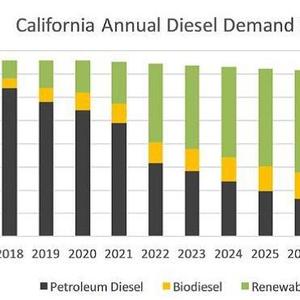Biodiesel, renewable diesel set to replace petro diesel in Calif.

Source: California Advanced Biofuels Alliance
February 6, 2019
BY The California Advanced Biofuels Alliance
Gov. Gavin Newsom’s stated goal of eliminating petroleum diesel emissions in California by 2030 is achievable through the growth in the market for clean, sustainable diesels, according to a new report from the California Advanced Biofuels Alliance.
Transitioning to sustainable diesels will represent a 71 percent decrease in greenhouse gas (GHG) emissions compared to those from climate-changing petroleum diesel, the report states. Furthermore, through a mixed approach of efficiency improvements, further electrification of vehicles and continued growth in the use of sustainable clean diesel fuels, the state can significantly improve air quality for millions of Californians, particularly those living in disadvantaged communities.
The findings are contained in “A Roadmap for Eliminating Petroleum Diesel in California by 2030,” an industry report on the impact and viability of sustainable fuels. Use of the two major types of sustainable diesel fuel (biodiesel and renewable diesel) has grown rapidly since 2010, jumping from less than 1 percent to approximately 15 percent, the report states.
Advertisement
Advertisement
“Production of our clean, sustainable diesel fuels continues to rapidly expand,” said Tyson Keever, CABA’s current chair. “The data shows that we will be able to produce enough supply of sustainable diesel to completely replace petroleum diesel to meet the governor’s goals.”
Renewable diesel and biodiesel are made from second-use materials (feedstocks) such as vegetable oils, used cooking oil and animal fats. These feedstocks are renewable, rather than petroleum based.
“The growth of sustainable diesel could mean a reduction of 263 million tons of GHG emissions by 2030,” Keever said. “This continued shift towards sustainable diesels will produce far fewer greenhouse gas emissions, and with an anticipated 80 percent supply of renewable diesel and 20 percent biodiesel, low-carbon diesel can completely replace petroleum diesel to meet the governor’s goal.”
Most of California’s petroleum diesel use is in low-income areas, with the South Coast and Central Valley being the two areas with the worst air quality in California. Sustainable, nonpetroleum diesel fuels are clean, viable sources of energy that will have an enormous health benefit to Californians everywhere.
Advertisement
Advertisement
“We look forward to seeing marked improvements in air quality and a corresponding health benefit for Californians as we move toward a sustainable-diesel future,” said Jennifer Case, immediate past chair of CABA. “Elimination of petroleum diesels will help reduce asthma, cardiovascular disease and some cancers.”
While sustainable diesel will heavily contribute to improving the livelihood of Californians, there is no one magical solution to solving all of the state’s air quality goals.
“The sustainable diesel industry is happy to provide a critical option that keeps the state on track to meet its zero emission goals,” Case said. “Our report shows that the state’s Low Carbon Fuel Standard and aggressive zero-petroleum diesel goals are possible with support of the clean, sustainable diesel market.”
Related Stories
CoBank’s latest quarterly research report, released July 10, highlights current uncertainty around the implementation of three biofuel policies, RFS RVOs, small refinery exemptions (SREs) and the 45Z clean fuels production tax credit.
The U.S. EPA on July 8 hosted virtual public hearing to gather input on the agency’s recently released proposed rule to set 2026 and 2027 RFS RVOs. Members of the biofuel industry were among those to offer testimony during the event.
The USDA’s Risk Management Agency is implementing multiple changes to the Camelina pilot insurance program for the 2026 and succeeding crop years. The changes will expand coverage options and provide greater flexibility for producers.
President Trump on July 4 signed the “One Big Beautiful Bill Act.” The legislation extends and updates the 45Z credit and revives a tax credit benefiting small biodiesel producers but repeals several other bioenergy-related tax incentives.
CARB on June 27 announced amendments to the state’s LCFS regulations will take effect beginning on July 1. The amended regulations were approved by the agency in November 2024, but implementation was delayed due to regulatory clarity issues.
Upcoming Events










